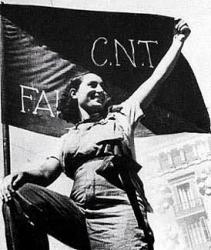|
Democracy: mob rule?
|
|
| Menace |
Date: Monday, 24/Jan/11, 8:43 PM | Message # 1 |

Heads
Posts: 6764
|
This video is from Jonathan's documentary "The Golden Rule", it amazes me how many conservatives and liberals claim the mantle of democracy when none of them really support true democracy, what you prefer a republican oligarchy where an elite rules the many? or a society where the majority rules?. Just watch the video and comment.

|
|
|
|
| eboyd |
Date: Thursday, 27/Jan/11, 1:28 PM | Message # 2 |

Heads
Posts: 13145
|
Stating that "the majority rules" implies an idea that I don't think you are trying to associate with. That is an over simplification of anarchist style democracy in my opinion. This statement makes it impossible to differentiate between your anarchist style of democracy and Rousseau's social contract based on subjugation of the individual to the authority of the majority. This neglects Proudhon's individualist social contract and Lysander Spooner's general critique of the social contract. Yes, I know you are a traditional anarchist and not an individualist, but even in that sense, Parecon takes that idea and solves the problem of majority rule over powering the will of the minority with the idea of decisions being made by individuals according to the degree by which they are effected. I know you know all of this, but your statement doesn't make it clear on what you mean to individuals who are new to this discussion.
my new theme song

erikboyd60@hotmail.com
"True poetry can communicate before it is understood"
-T.S. Eliot
battle record:
7-0-0

|
|
|
|
| Menace |
Date: Thursday, 27/Jan/11, 4:05 PM | Message # 3 |

Heads
Posts: 6764
|
I know and understand but i meant exactly what i said, Rousseau's social contract or the social contract concept in general has nothing to do with majority rule in fact it has a lot do with minority rule, because the social contract implies that the people give up sovereignty to a government or other authority in order to receive or maintain social order through the rule of law. The democracy versus Republicanism battle never was fair and balanced, majority rule has been mystified and obstructed for centuries, you should know better because all of these are closely connected to concepts as natural rights and legal rights, a minority always gave a social contract and certain rights to the people, never the people self governed themselves ( with some small exceptions which you know) and decided themselves in their own communities and workplaces how they will live on what guidelines etc. Even though many individualists think the social contract is some sort of majoritarian rule, that's not the case their natural rights came from this social contract impended by a minority to a majority without consent from the majority.

|
|
|
|
| eboyd |
Date: Friday, 28/Jan/11, 0:20 AM | Message # 4 |

Heads
Posts: 13145
|
We need to get on MSN IM to discuss this a bit more, but I will say the very reason I brought that up IS because I've been studying social contract theory specifically for the legal rights section of chapter 1 of my book. What I was talking about in my last comment was not the practical application of social contract, which is, in fact, generally a contract binding the majority to give up sovereignty of their person to a minority, but rather the theory put forth by Rousseau of a social contract which binds the individual to the rule of the common good. Rousseau's social contract -- in theory only, not in practice -- was meant to be, in effect, a contract of democratic majority rule, and even in theory I detest it. Proudhon, on the other hand, presented a social contract that did not bind an individual to a state -- whether that state consist of a minority or the people as a whole -- but instead bound individuals to an agreement between each other. I find this thinking as obsolete as you probably do, but I find it far more reasonable than Rousseau's idea of majority rule. I personally tend to gravitate towards Spooner's critique of the social contract and, from your last comment, I assume you do too.
my new theme song

erikboyd60@hotmail.com
"True poetry can communicate before it is understood"
-T.S. Eliot
battle record:
7-0-0

|
|
|
|
| Menace |
Date: Friday, 28/Jan/11, 4:17 PM | Message # 5 |

Heads
Posts: 6764
|
Well, i advise you to actually read Rousseau's social contract because that's what i actually thought Rousseau's social contract meant in theory as yourself, before reading the actual thing i thought the same, but after reading it everything seems kinda clear, Rousseau's idea exemplifies liberal republicanism, although it eludes to majoritarian rule the whole books is based on the premise that any administration, whatever form it takes, should be divided into two parts. First, there must be the sovereign (which Rousseau states must consist of the whole population) who represents the general will and is the legislative power within the state. The second division is that of the government, being distinct from the sovereign. This division must be since the sovereign cannot deal with particular matters (it is then acting as particular wills and not the general will — the sovereign is no longer whole and therefore ruined), like applications of the law. Therefore a government must be separate from that of the sovereign body. This meaning the state is separate from the masses. You can google search "Of The Social Contract, Or Principles of Political Right" by Rousseau you can find it online. Quote (eboyd) Proudhon, on the other hand, presented a social contract that did not bind an individual to a state -- whether that state consist of a minority or the people as a whole -- but instead bound individuals to an agreement between each other. Yes, thats actually called free agreement and free association Proudhon called it a social contract, people like Kropotkin and Bakunin for example took this and developed it to another dimension, as you already know trough free association and agreement individuals can form free federations, classical individualists tend to dismiss this not because this leads to a sort of tyranny but because individualists hold to an egoistic metaphysical ideal that their own pleasure is above all, you should read " The Ego and its own" by Max Stirner, modern individualism and especially American individualism is closely connected to proprietary individualism rather then original classical individualism. Also that's why i think Proudhon's idea of a "social contract" is not really a social contract.

|
|
|
|
| eboyd |
Date: Monday, 31/Jan/11, 1:26 PM | Message # 6 |

Heads
Posts: 13145
|
Ok, no doubt, I'll check all that out as obviously I haven't yet done so sufficiently and you obviously know more than I do on the topic. Thanks! And yeah, I've been meaning to read "The Ego and its Own".
my new theme song

erikboyd60@hotmail.com
"True poetry can communicate before it is understood"
-T.S. Eliot
battle record:
7-0-0

|
|
|
|
| Menace |
Date: Monday, 31/Jan/11, 10:09 PM | Message # 7 |

Heads
Posts: 6764
|
No problem, i get irritated when many people compare American style individualism which is proprietary individualism with classical individualism which i consider more authentic because American style individualism rests to much on owning propriety and things like that which don't really seem very individualistic, for example the Bonnot Gang represented the egoistical and dementia driven nature of true individualism, these people owned nothing robbing to eat and traveling everywhere exactly as outlaws. http://en.wikipedia.org/wiki/Bonnot_Gang

|
|
|
|
| eboyd |
Date: Monday, 31/Jan/11, 11:33 PM | Message # 8 |

Heads
Posts: 13145
|
Quote (Menace) No problem, i get irritated when many people compare American style individualism which is proprietary individualism with classical individualism which i consider more authentic because American style individualism rests to much on owning propriety and things like that which don't really seem very individualistic, for example the Bonnot Gang represented the egoistical and dementia driven nature of true individualism, these people owned nothing robbing to eat and traveling everywhere exactly as outlaws. http://en.wikipedia.org/wiki/Bonnot_Gang no doubt. i will say though that there are a significant portion of American anarchists, including individualists, who are very much or at least somewhat in line with true individualism. in fact, i would say most are, but American individualists get stereotyped because of Murray Rothbard and the right-wing "libertarian" movement that is so prominent here. for example, Lysander Spooner was markedly anti-capitalist(of course some socialists critique him for running a postal service that rivaled the USPS before it was shut down by the government), Josiah Warren, Benjamin Tucker, etc., and that is not to mention the non-individualist anarchists such as Chomsky and Bookchin.
my new theme song

erikboyd60@hotmail.com
"True poetry can communicate before it is understood"
-T.S. Eliot
battle record:
7-0-0

|
|
|
|
| eboyd |
Date: Monday, 31/Jan/11, 11:34 PM | Message # 9 |

Heads
Posts: 13145
|
so anyways, are you going to respond to my emails? 
my new theme song

erikboyd60@hotmail.com
"True poetry can communicate before it is understood"
-T.S. Eliot
battle record:
7-0-0

|
|
|
|
| Menace |
Date: Tuesday, 01/Feb/11, 12:05 PM | Message # 10 |

Heads
Posts: 6764
|
Quote (eboyd) no doubt. i will say though that there are a significant portion of American anarchists, including individualists, who are very much or at least somewhat in line with true individualism. in fact, i would say most are, but American individualists get stereotyped because of Murray Rothbard and the right-wing "libertarian" movement that is so prominent here. for example, Lysander Spooner was markedly anti-capitalist(of course some socialists critique him for running a postal service that rivaled the USPS before it was shut down by the government), Josiah Warren, Benjamin Tucker, etc., and that is not to mention the non-individualist anarchists such as Chomsky and Bookchin. Correct, i was talking about right wing libertarians not about American anarchism in general, because these people represent now days the image of American anarchism and libertarianism, the anarchist and libertarian socialist movement in the USA was systemically destroyed by the US government in the 20's and early 30's, so what we see now as the current IWW, NEFAC etc. are the remains of the old movement, this state repression gave the upper hand to right wing libertarianism they gave them ground its sad but true. Quote (Menace) so anyways, are you going to respond to my emails? Yes i will, but overall i responded to all of your things in your original email, i will email you and discuss further

|
|
|
|
| eboyd |
Date: Tuesday, 01/Feb/11, 3:22 PM | Message # 11 |

Heads
Posts: 13145
|
lol alright  i did send you emails after our last discussion though, plus i need to talk about legal structures, because i'm having a struggle with that atm. i am also trying to find contradictions in Proudhon's thinking, specifically in terms of his incarnation of the Labor Theory of Property, due to his reliance on natural rights. if you can help i'd be grateful. i did send you emails after our last discussion though, plus i need to talk about legal structures, because i'm having a struggle with that atm. i am also trying to find contradictions in Proudhon's thinking, specifically in terms of his incarnation of the Labor Theory of Property, due to his reliance on natural rights. if you can help i'd be grateful.
my new theme song

erikboyd60@hotmail.com
"True poetry can communicate before it is understood"
-T.S. Eliot
battle record:
7-0-0

|
|
|
|